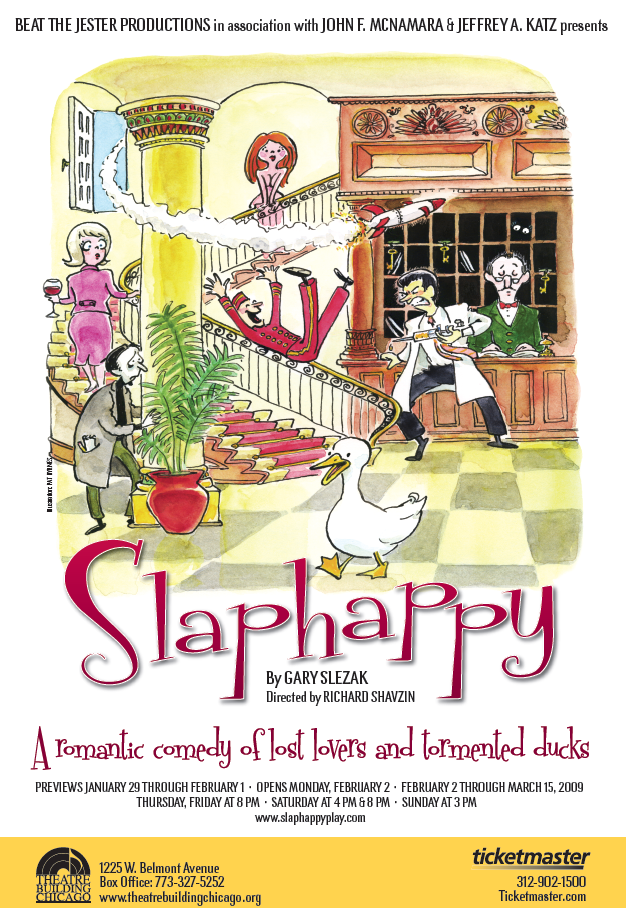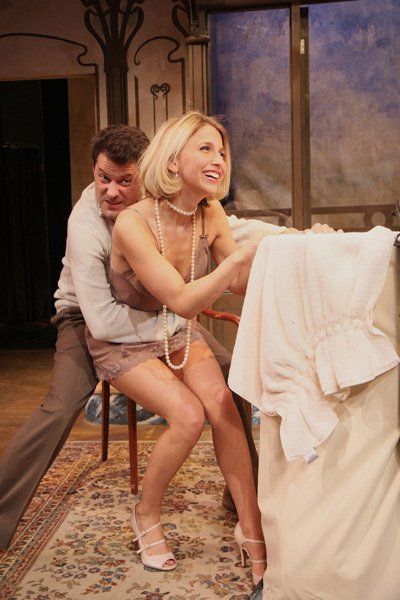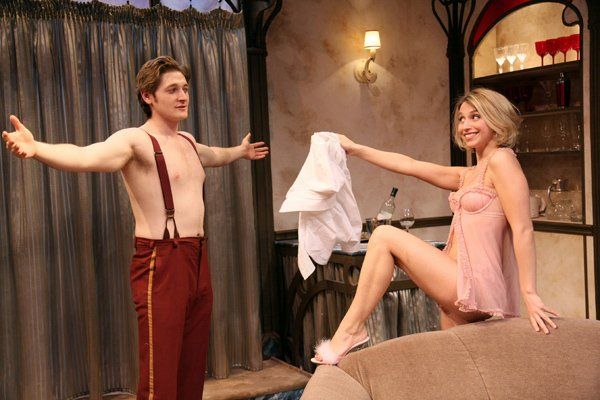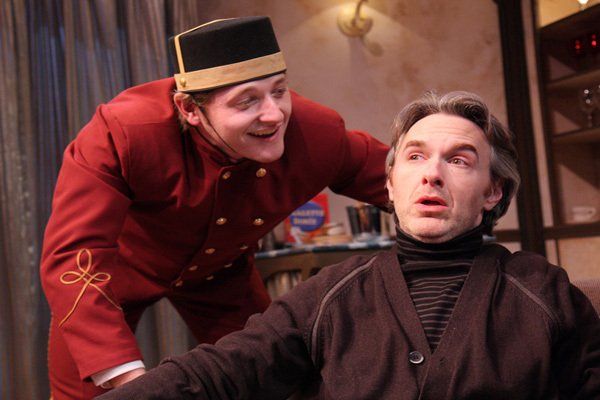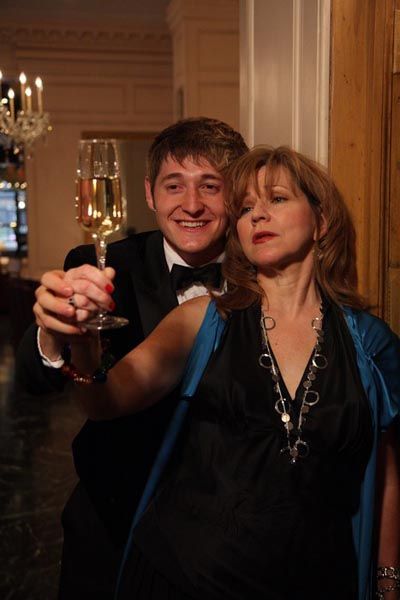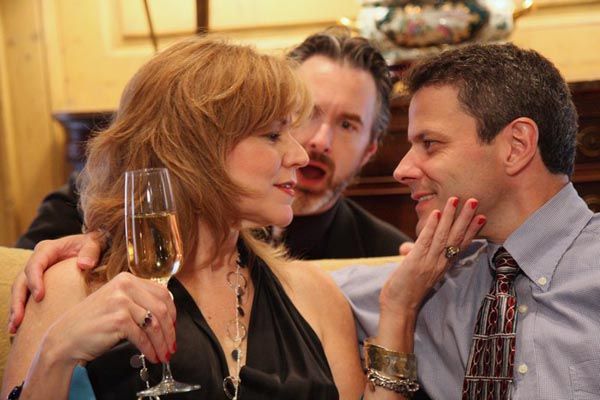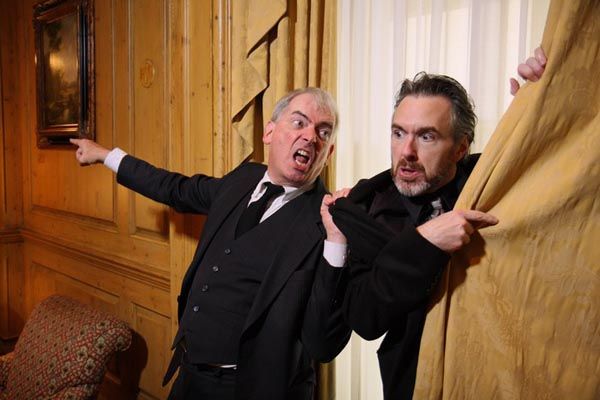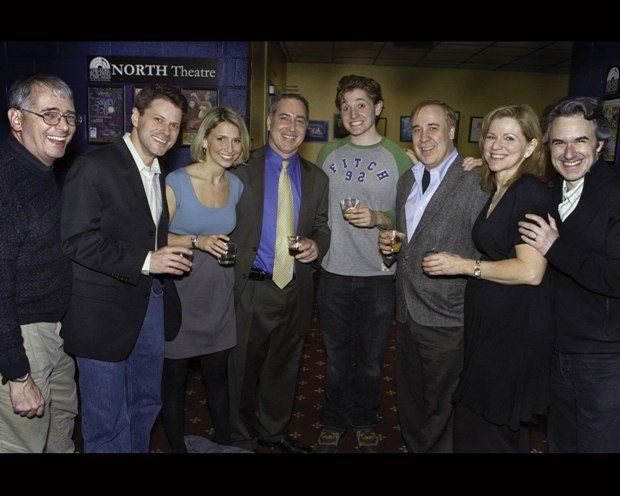Plays and Stories by Gary Slezak
Plays and Stories by Gary Slezak
Slaphappy
Slaphappy cast
*JUDY BLUE (Laurel) was recently seen in Talking Pictures and Blind Date in the Horton Foote Festival at the Goodman, Gary at Steppenwolf, The Intelligent Design of Jenny Chow with Collaboraction, Syzygy Theatre Group's critically acclaimed American premiere of Tender by Abi Morgan in Los Angeles, and American Musical Theatre Project's workshop of Dangerous Beauty. She has performed at Chicago Shakespeare Theater, and in many productions at the Goodman including the premiere of Richard Nelson's Frank's Home, A Little Night Music, House and Garden, and Night of the Hunter. Recently she had the pleasure of working with Elizabeth Berg on the adaptation of her novel The Pull of the Moon at 16th St. Theatre. Judy has also appeared in Fool for Love at B Street Theatre and in premieres of Horton Foote, Jack Heifner, Roger Rueff, Todd Logan and many others. She has appeared in film (most recently Malik Yusef's Hollywood Jerome), radio, television and theatres across the country, including Drury Lane Oakbrook, The Organic, New York's Henry St. Theatre, Apple Tree, Dallas Theater Center, Movement Theatre International, B Street, Theatre Three, Stagewest, Casa Mañana and Arkansas Rep. Judy is an Associate Artist at Chicago Dramatists, a company member of The Shakespeare Project of Chicago, ensemble member of L.A.'s Syzygy Theatre and an Affiliate Artist at American Theater Company.
*MICHAEL JOSEPH MITCHELL (Stanek) appeared most recently in Chicago in the one-person piece Underneath the Lintel by Glenn Berger, directed by Kristine Thatcher in a co-production by City Lit Theatre and BoarsHead Theater, Michigan. The performance is currently nominated for a Jeff Award for best solo performance. He has just finished playing Paul Barrow in Permanent Collection at BoarsHead, also directed by Ms. Thatcher. Previous BoarsHead appearances include Fr. Brendan Flynn in Doubt, Truman in Capote's Holiday Memories, and an earlier run of Underneath the Lintel. Other Chicago appearances include Georges Cuvier in Lydia Diamond's Jeff Award-winning play Voyeurs de Venus at Chicago Dramatists, directed by Russ Tutterow, and four roles in the new musical In the Bubble, based on the film The Boy in the Plastic Bubble (no joke), directed by Michael Greif. At Drury Lane Oakbrook he was Bob Cratchit in A Christmas Carol, as well as roles in On Golden Pond, The Musical Comedy Murders of 1940, and Aresenic and Old Lace. At the Noble Fool he was in Don't Drink the Water, and at Notre Dame Summer Shakespeare in Much Ado About Nothing as Don John. Before that, in New York City, he was a member of the Actors' Alliance, where he played Byelinkov in Wendy Wasserstein's Man in a Case, and Blackfriars Shakespeare Company, where he played Benedick in Much Ado, and Sebastian in As You Like It, among others. With Shades of Grey Co. he was Clancy in Waiting for Lefty, directed by Ted Kazanoff, and at Theatre Three as Bobby in American Buffalo and Austin in True West.
*DOUG MACKECHNIE (Kip) is a well-known actor whose recent credits include A Christmas Story for Theater Wit, The Romeo and Juliet Story for Summer Shakespeare at Notre Dame, and the World premiere of Unnecessary Farce at BoarsHead Theater in Lansing, MI. Other Chicago credits include Polish Joke, Don't Drink the Water (Noble Fool); That Championship Season, Pitz & Joe (Red Hen Productions); Uncle Fred in the Springtime, Taking Steps, She Stoops to Conquer (City Lit Theater); Artist Descending a Staircase, How the Other Half Loves, Noises Off (Broutil & Frothingham Productions); Translations (Seanachaí); An American Daughter (Organic Theatre); Principia Scriptoriae (Circle Theatre) and many Saturday Series staged readings at Chicago Dramatists, where he is an Associate Artist. Doug hold an M.F.A. from The Theatre School, DePaul University.
MAURICE MCNICHOLAS (Valere) has been acting for over 30 years in theatre, television radio and film. He holds degrees from both the University of Illinois and St. Xavier College (now University). His stage roles have included Aristide Bruant in VanGogh, Goldman/Dorf in The Man In the Glass Booth for the Performer's Arena; The Shakespearean King in The Adventures of Baby Clown Foo at the Children's Theater of Second City: Bach in the Bach and Handel Fest and The Voice of the Sphinx both for the Young People's Concerts at the Chicago Symphony Orchestra. His film credits include Risky Business with Tom Cruise; The Untouchables with Sean Connery and Kevin Costner; and Child's Play with Chucky the Killer Doll. In television he has appeared in The Untouchables and on both the History Channel and National Geographic Channel. His most recent film appearance was as the Prime Minister of Irregular Debris in Lost and Found which was shown at this year's Cannes Festival and the upcoming film Pickman's Muse.
ANNIE DIMARIA (Cherie) received her B.F.A. from Illinois Wesleyan University and trained at the British American Drama Academy under Fiona Shaw and Alan Rickman. She was last seen as a foul-mouthed bride in 13 Carat Productions' 4Play. Previous credits include roles in Julius Caesar, As you Like It, Measure for Measure, Three Sisters and The Beard of Avon. This spring, Annie can be seen in the The Prime of Miss Jean Brodie with Signal Ensemble Theatre.
LUCAS NEFF (Philippe) recently graduated with a B.F.A. in Performance Art from UIC. He is also a graduate of The School of Steppenwolf class of 2008 and studied with Yasen Peyankov and the Bulgaria Exchange Workshop. This fall Lucas stars as Jon in Collaboraction's production of Jon. Previous roles include Hamlet in UIC's production of Shakespeare's classic, as well as roles in productions of Angels in America, Kentucky Cycle, Three Sisters, Balm in Gilead and King Lear.
Slaphappy Production Staff
GARY SLEZAK (Playwright, Producer) grew up on Chicago's Southside and began writing plays as an undergraduate at Western Illinois University. There his first play was produced, a political satire entitled Every Fourth November. Sketcher in the Wry, an evening of short plays, followed at Body Politic. Malek's Dependents, a play set in a Southside liquor store, was developed at Victory Gardens and produced by The People's Light and Theatre Company, where it received excellent reviews in The Baltimore Sun and Philadelphia Daily News. Mr. Slezak wrote and produced Beat the Jester at Chicago Dramatists in 2004, which was well-received by The Reader and The Onion, recommended by Chicago Stage Talk Radio and described by the Chicago Sun-Times as "a searing drama…a potent brew of political intrigue, sibling rivalry and Oedipal passions." Other full-length plays include One if by Land, Two if by Sea; The Measure of All Things, Night at the Century and Entering Paris. Recent short plays include Five Stages of Drunkeness, Paindude, Leonard Bernstein's Birthday, and The Christmas War. Gary Slezak is also the author of published fiction and non-fiction, and has been a finalist for a Jerome Fellowship. He works on the Chicago campus of Northwestern University.
*RICHARD SHAVZIN (Director) was the Artistic Director of Strawdog Theatre Company from 1993-1998, where he received a Jeff Award for Direction of Burn This. Also at Strawdog, he directed the world premiere production of Studs Terkels' Race, as well as the Jeff-Nominated productions of Criminal Hearts; Cat's –Paw; The Big Funk; A Mother, A Daughter and A Gun; Skeletons; and Hurlyburly. Other directing credits include the Chicago premiere of Gary Slezak's Beat the Jester at Chicago Dramatists in 2004, Vick's Boy for American Theater Company, Endangered for Stage Left's Leapfest, and the world premieres of Tops or Bottoms and Fallout (Canamac Productions), Changing Rainbows (Red Wolf Theatre), Klub Kokomo (PS Theatricals), and the workshop production of Any Someone At All at Second City's Skybox Theater. Mr. Shavzin was awarded a special Jeff for creating the Unified non-Equity General Auditions. As Resident Director for Cienstory's First Read at Second City, he directed new screenplays by Groundhog Day author Danny Rubin, Jay Stapleton, and Big Night co-author Joe Tropiano. Richard Shavzin served on the Board of Directors of the League of Chicago Theatres from 1994-2000, and served two terms on the Theatre Peer Review Panel of the City of Chicago Department of Cultural Affairs. He is currently on the Central Board of Actors Equity, and is a Vice-President of the AFTRA Chicago local.
*ADAM GANDERSON (Stage Manager) is new to Chicago but has already worked on several notable productions, including A Christmas Story (Noble Fool Theatricals), Dr. Jekyll and Mr.Hyde (Northlight Theatre), Cadillac (Chicago Dramatists), and Don Giovanni (Chicago Opera Theatre). Other regional work includes Misery and the Bomb-itty of Errors (Syracuse Stage), Pride and Prejudice (Dallas Theatre Center) and Dance of the Holy Ghosts (Yale Repertory Theatre). Mr. Ganderson holds a B.S in Mechanical Engineering from Massachusetts Institute of Technology and an MFA in Stage Management from the Yale School of Drama.
Press & Reviews
Slezak readily acknowledges the autobiographical elements in his story—inspired by a walk in Paris' famous Père Lachaise cemetery—making his grasp of his slapstick prototype as admirable as the unexpected sympathy he extends his venerable archetypes. The sheer physical manipulation needed to construct situations involving men dressed in duck suits, missile explosives concealed in laundry carts and doses of mis-administered pharmaceuticals...demands more attention than their authors often anticipate. But Slezak resists the temptation to wallow in his own nostalgic memories, instead applying himself to the mechanics of his plot-driven exercise. Director Richard Shavzin and his cast also exhibit the skills necessary to playing this brand of fast-paced mayhem...scrambling over Richard and Jacqueline Penrod's art-nouveau-on-a-budget suite...with unflagging energy, agility and enough charm to make us wish for a happy resolution to their difficulties. Whether Slaphappy can repeat the success of the glitzier Don't Dress For Dinner remains to be seen, but in these grim times, its generous optimism and universal hope for reconciliation should appeal to the same audiences."
Windy City Times
"Our Best Bet".
Chicago Tribune
"Grand mischief... well thought out and beautifully delivered... Neff truly amazes.:
Chicago Free Press
"Whimsical... appeals to all ages... I took heart in the play's message."
GapersBlock.com
"Briskly paced and breezily acted... calls to mind Coward's Private Lives... a multitude of door slamming farcical high jinks... director Shavzin maintains a light touch... as staunchly, effortlessly insubstantial as it should be."
Time Out Chicago
"Slezak is good at delivering wry, dry one-liners, and the cast...good at delivering them, especially Judy Blue as a tippling American divorcee and Lucas Neff as a Parisian bellhop with sidelines in therapy and terrorism."
Chicago Reader
"The constant entrances and exits, the socioeconomic diversity of the cast, and the nearly imminent potential for fornication make it a setting rich in comic potential. Set in a lavish Paris Hotel, Slaphappy contains all the elements, including an ingrained love for pâté and the most controversial dish this side of veal: foie gras..."
Decider Chicago
"As Noel Coward proved time and again, a successful romantic comedy requires only three things: lovers clearly meant for each other, enough obstacles to keep them apart...and a playwright who makes it all look easy...briskly paced and breezily acted...calls to mind Coward's Private Lives...a multitude of door slamming
farcical high jinks...director Shavzin maintains a light touch...as staunchly, effortlessly insubstantial as it should be."
Time Out Chicago
Slezak readily acknowledges the autobiographical elements in his story—inspired by a walk in Paris' famous Père Lachaise cemetery—making his grasp of his slapstick prototype as admirable as the unexpected sympathy he extends his venerable archetypes. The sheer physical manipulation needed to construct situations involving men dressed in duck suits, missile explosives concealed in laundry carts and doses of mis-administered pharmaceuticals...demands more attention than their authors often anticipate. But Slezak resists the temptation to wallow in his own nostalgic memories, instead applying himself to the mechanics of his plot-driven exercise. Director Richard Shavzin and his cast also exhibit the skills necessary to playing this brand of fast-paced mayhem...scrambling over Richard and Jacqueline Penrod's art-nouveau-on-a-budget suite...with unflagging energy, agility and enough charm to make us wish for a happy resolution to their difficulties. Whether Slaphappy can repeat the success of the glitzier Don't Dress For Dinner remains to be seen, but in these grim times, its generous optimism and universal hope for reconciliation should appeal to the same audiences."
Windy City Times
"Our Best Bet".
Chicago Tribune
"Grand mischief... well thought out and beautifully delivered... Neff truly amazes.:
Chicago Free Press
"Whimsical... appeals to all ages... I took heart in the play's message."
GapersBlock.com
"Briskly paced and breezily acted... calls to mind Coward's Private Lives... a multitude of door slamming farcical high jinks... director Shavzin maintains a light touch... as staunchly, effortlessly insubstantial as it should be."
Time Out Chicago
"Slezak is good at delivering wry, dry one-liners, and the cast...good at delivering them, especially Judy Blue as a tippling American divorcee and Lucas Neff as a Parisian bellhop with sidelines in therapy and terrorism."
Chicago Reader
"The constant entrances and exits, the socioeconomic diversity of the cast, and the nearly imminent potential for fornication make it a setting rich in comic potential. Set in a lavish Paris Hotel, Slaphappy contains all the elements, including an ingrained love for pâté and the most controversial dish this side of veal: foie gras..."
Decider Chicago
"As Noel Coward proved time and again, a successful romantic comedy requires only three things: lovers clearly meant for each other, enough obstacles to keep them apart...and a playwright who makes it all look easy...briskly paced and breezily acted...calls to mind Coward's Private Lives...a multitude of door slamming
farcical high jinks...director Shavzin maintains a light touch...as staunchly, effortlessly insubstantial as it should be."
Time Out Chicago
The Fois Gras Wars
James Bond vs. Foie Gras
Sir Roger Moore, a.k.a. James Bond, used to eat foie gras. But when he learned about the dark side of the industry, he vowed never to eat this "delicacy of despair" again, and he volunteered to narrate a documentary about the cruelty of foie gras production. Read more about Special Agent 007's battle against the foie gras industry.
People around the world have spoken out against the cruelty of foie gras. In 2004, California passed a law banning the sale and production of foie gras, effective in 2012. His Holiness Pope Benedict XVI denounced force-feeding as being in violation of Biblical principles, and foie gras production has been outlawed in the U.K., Germany, the Czech Republic, Finland, Luxembourg, Norway, Poland, Sweden, Switzerland, Denmark, and Israel.
From SuperChefBlog:
Meanwhile, British celebrity chef Rick Stein OBE is getting hammered on his side of the Atlantic, too, for not coming down clearly and strongly enough against the French-devised evil of gavage. Recently, n his BBC Two TV series French Odyssey he stated that gavage was no worse than keeping battery hens.
In response to criticism, Chef Stein clarified last Friday on BBC Radio 4:
I really like foie gras and I imagine there are much more cruel things to be seen in British farming... I am not saying we should fail to disapprove about what the French are doing with their geese and ducks but maybe we should start not turning a blind eye to what goes on in our own farms... I think there are a lot of intensive farming practices in this country, and in France of course, that are more cruel than that... I was shocked by what I saw, but all I am saying is 'Let's clean up our own back yard first'.
In all the hubbub, superchefblog wonders aloud: has anyone seen The Meatrix lately?
From Chicago Tribune:
Foie gras ban, we hardly knew ye By Phil Vettel
This fight was never about the foie gras.
Last week, the Chicago City Council repealed its foie gras ban. Chefs hailed the action as a victory for personal choice and a repudiation of the nanny state. The People for the Ethical Treatment of Animals called it a craven capitulation to special interests. And Ald. Joe Moore (49th), who sponsored the 2006 ban, called it an outrageous display of old-time Boss politics.
I think the ban was repealed because people were laughing at us.
From the day the law was passed--bundled into an omnibus bill and approved via voice vote--local chefs began crying foul. Obviously, some French chefs had their Gallic shorts in a knot because an integral piece of their culinary history was being singled out, its production labeled as being inherently more cruel and inhumane than the way pigs, chickens and other dinner-plate-bound animals meet their doom.
But most chefs I spoke to expressed unconcern with foie gras, per se. Their objection--and this was voiced by chefs who rarely if ever served foie gras--was that the City Council was telling them what they could and could not cook. Chefs wondered aloud what might be next--veal? lobster?--on the City Council's list of Thou Shalt Nots.One way to galvanize an artistic=2 0community--and make no mistake, Chicago's fine-dining chefs qualify--is to whisper the word censorship. Or, in the case of the foie gras ban, to practically scream it.
And one way to drum up interest in an item is to tell the people they can't have it.
In the four months in 2006 between the date the foie gras ban was passed (April 26) and when it went into effect (Aug. 22), restaurants reported a surge in foie gras sales. Whether liver-loving Chicagoans were loading up on a dish that was about to disappear, or curious diners were ordering the dish to see what the fuss was about, restaurants such as Cyrano's Bistrot & Wine Bar claimed to be selling foie gras like never before. Chefs organizing legal challenges to the ordinance hosted well-attended foie gras fundraisers.
And then the ban went into effect, and things really got silly.
Restaurant owners--and the customers who supported them--wasted no time finding creative ways around the law. I had an especially luscious "chicken liver terrine" at Cyrano's, har-de-har-har. Copperblue managed to source duck liver that tasted suspiciously wonderful; the owner maintained that it had come from naturally fed ducks, and who was qualified to dispute it?
(Here's a hint: A 6-pound duck will not produce a 2-pound liver without outside assistance.)
Bin 36 offered a premium-priced salad of figs, apricots and honey, "and the foie gras torchon is on us." That's what the menu said. The restaurant wasn't selling foie gras, it was selling a salad and giving away the liver.
When the Health Department inspectors arrived at Bin 36 and decided that this transparent bit of legerdemain passed muster, declining to issue a citation, the battle was over. Basically, anyone who wanted to serve foie gras did so.
Not that I blame the Health Department. When your main mission is to prevent food-borne illness, how much time do you want to spend rounding up duck-liver scofflaws, especially when your boss' boss' boss (that would be the mayor) has publicly decried the City Council's action as "the silliest thing they've ever done"?
So foie gras became a banned substance that was readily available to anyone who wanted it, abetted by an agency that had little time, or appetite, for enforcement.
And to be honest, that's really where I expected matters to rest. I predicted that this "don't ask, don't tell" status would remain for the foreseeable future. It allowed the animal-rights people their victory and let the City Council claim the high road while inconveniencing a few chefs just a bit (and foie gras-seeking customers not at all).
What I didn't fully appreciate is how embarrassing this ordinance was for certain city leaders, and how badly they wanted it to go away.
Ald. Bernard Stone (50th) quickly recanted his support of the ban, saying, "Anybody who=2 0has traveled anywhere in this country knows that people are just laughing their heads off at us."
The foie gras ban became a joke on Comedy Central's "The Colbert Report." TV food personality and author Anthony Bourdain, never at a loss for a cutting comment, said in an interview that the ban made Chicago look like "some stupid cow town."
And a city trying to become an Olympic destination doesn't want to look like a stupid cow town.
If ever the aldermen truly supported the ethical issues of foie gras production, and I suspect that support was weak at best, it quickly disappeared in a flurry of snickers (not the candy bar). Some aldermen claimed not to have realized what they were voting for back in 2006. (Which is very likely true; omnibus bills typically contain routine matters and aldermen rarely give them a second glance.)
Chicago Chefs for Choice, an ad hoc organization opposed to the ban, provided a couple of experts to rebut the claims that force-feeding (which is how duck and goose livers become engorged) was cruel and painful, and that was all the convincing some aldermen needed.
So Ald. Tom Tunney (44th) crafted a repeal, and Wednesday the mayor--over Moore's loud and repeated demands for discussion and debate--brought it immediately to a vote.
The vote to repeal was 37-6.
Chicago's foie gras law--dubious in its support, sporadic in its enforcement and mocked by a nation--died almost as quickly as it was passed.
And if there's a lesson here, it's that you don't get rid of something you don't like by banning it.
You tax it.
Phil Vettel is the Tribune's restaurant critic.
From the New Tork Times: September 15, 2005
A Chicago Alderman's Proposal to Ban Foie Gras Stirs Up a Debate By GRETCHEN RUETHLING
CHICAGO, Sept. 14 -This city is considering a proposal to trim fatty goose and duck livers from the menus of Chicago restaurants, stirring debate over whether it has a right to tell people what they can put on their plates.
"Our laws are a reflection of our culture," said Joe Moore, an alderman who has proposed banning the sale of foie gras in the city , as he addressed the council's health committee on Tuesday. "Our culture does not condone the torture of innocent and defenseless creatures. And we as a society believe all God's creatures should be treated humanely."
Foie gras, which means "fatty liver" in French and is most commonly served in upscale restaurants, is produced by force-feeding grain to ducks and geese several times a day through a pipe that is inserted in their throats, causing their livers to expand up to 10 times their normal size within weeks.
Charlie Trotter, the celebrity chef whose restaurant here bears his name, quietly stopped serving the dish four years ago after he visited foie gras farms and was appalled at how it was produced. His decision made newspaper headlines in March and inspired Mr. Moore's proposal, which could be voted on by the end of the year. "I never wanted to become the de facto poster boy for the no foie gras movement," Mr. Trotter said. The proposal follows a unanimous vote in the State Senate to ban force-feeding birds for the production of foie gras in Illinois. It will be considered by the House next year. Last year,
California banned th e production and sale of foie gras starting in 2012, and legislation regulating it has been introduced in New York, Massachusetts and Oregon.
“Foie gras has been around since the age of cuisine. Some animals are raised for food. They’re raised to die.”
Rick Tramanto Chef at Tru in Chicago
“Our culture does not condone the torture of innocent and defenseless creatures.”
Joe Moore of Chicago Alderman
Marcus Henley, operations manager for Hudson Valley Foie Gras in New York, one of three foie gras producers in the country, said that the birds were not treated cruelly and that scientific evidence showed they did not suffer. "The anthropomorphism makes this a very easy sell," Mr. Henley said of the bans.
Although Mr. Trotter, 46, stopped serving foie gras, he questioned the government's role in banning it, saying the decision should be left up to consumers and business owners.
"It's pretty soon going to be legislated to death, and pretty soon we won't need to think because the government will think for us," Mr. Trotter said.
Rick Tramonto, 43, a well-known Chicago chef at the restaurant Tru, called the proposed ban a travesty and said he wondered where the line would be drawn because other animals, like chickens, were mistreated. "Foie gras has been around since the age of cuisine," Mr. Tramonto said. "Some animals are raised for food. They're raised to die."
Last spring, Mr. Tramonto and Mr. Trotter got into a name-calling spat over the matter.
Mr. Tramonto was quoted in The Chicago Tribune as calling Mr. Trotter hypocritical for selling other animal products but not foie gras. Mr. Trotter, in turn, told the newspaper that Mr. Tramonto was not "the smartest guy on the block."
Both men said on Tuesday that the disagreement was blown out of proportion and that they respected each other's opinions.
"I think we both regretted sort of getting dragged into the mud," Mr. Trotter said. "The real sto ry is to eat or not to eat foie gras."
Other Chicago restaurant owners that serve foie gras agreed that restaurants and consumers should be able to make their own decisions.
"I don't think it's really something that the city should be choosing for everyone," said Stephanie Izard, chef and owner of Scylla, one of at least 16 Chicago restaurants that serve foie gras. "Lezlie Keebler, a managing partner at Chestnut Grill and Wine Bar, said she would prefer not to sell it but does because it is popular. "I tell my chefs, you have to serve things people want to eat, not things you want them to eat," Ms. Keebler said. Some foie gras defenders argue that regulation is a slippery slope. "Government should not regulate how a farmer produces something," said John Hawkins, news service director for the Illinois Farm Bureau, which opposed the state legislation. "It would set a precedent."
But Holly Cheever, a veterinarian in Guilderland, N.Y., who spoke at the Chicago hearing, said she thought the city should "take a stand against such outrageous and heinous cruelty" by banning the sale of foie gras. "Even in the worst cases," Ms. Cheever said, referring to treatment of other animals for food production, "nothing touches this in terms of the cruelty involved."
Colleen McShane, president of the Illinois Restaurant Association, said the group planned to speak against the ban at the next City Hall hearing, which could be held as early as next month. "The government should not be telling us what to put on our menus unless it's a health issue," Ms. McShane said.
GarySlezak.com
